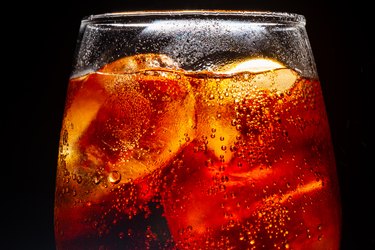
From soda to seltzer, bubbly drinks are high on the list when it comes to flavor. But with carbonation may come pain in your stomach. From gas to cramps to stomach pains, is your favorite canned beverage doing a number on your gut? Learn what soda does to your stomach, and tips to reduce symptoms.
Read more: Side Effects of Carbonated Drinks
Video of the Day
Video of the Day
Why Soda Hurts Your Stomach
You can thank the addition of carbon dioxide gas from carbonated drinks for causing the discomfort.
"The intake of gas in the form of carbonated drinks is in addition to the normal physiologic amount of gas in our own gut," says Aaron Cohn, MD, a gastroenterologist at Northwestern Medicine Lake Forest Hospital in Grayslake, Illinois.
"H2 (hydrogen), CO2 (carbon dioxide) and CH4 (methane) all come from bacterial fermentation and metabolism of food substrates. Increasing gas in your GI tract can cause excess bloating, uncomfortable fullness and cramping, and some people even feel nauseous," Dr. Cohn says.
You may also feel the effects in your chest and throat. "In addition to the classic gas pains, carbonated beverages can cause heartburn and reflux," says Dr. Cohn. "This is because stomach acid is often brought up alongside air during belching — the body's natural response to expel excess gas in the stomach."
It's believed that these symptoms occur due to a stretch on the stomach wall. "Researchers theorize that some stomachs can 'accommodate' this stretch better than others, which explains why some people feel the above symptoms more acutely than others," says Dr. Cohn.
Avoid Drinks With Artificial Sweeteners
Diet soda may be the biggest offender when it comes to gas pains in your stomach. "Simply put, artificial sweeteners are difficult or impossible for many people to digest," says Dr. Cohn. "Like fiber, these sweeteners can cause excess gas and bloating."
A study published in Molecules in February 2018 explored the relationship between artificial sweeteners and an unhealthy shift in the microbiome (the bacterial ecosystem living in the gut) in mice. Since the effects of artificial sweeteners on the gut and human health are largely unknown, studies like these are just beginning to unlock answers.
"Any shift in the microbiome inevitably shifts the production and consumption of intestinal and colonic gas," says Dr. Cohn.
And if you have irritable bowel syndrome (IBS), it's best to stay away from carbonated drinks. Research published in the journal BMC Gastroenterology in June 2012 found that participants who drank carbonated drinks reported more severe IBS symptoms.
"Even nominal amounts of increased gas in the GI tract from carbonated beverages can trigger symptoms of discomfort in people with IBS," says Dr. Cohn.
Read more: Is Carbonated Water Bad for You?
How to Reduce Stomach Pains
If you love carbonated drinks, consider the following tips to help avoid the discomfort:
- Skip the straw. "Mechanically, people inadvertently swallow a certain amount of air (aerophagia) when they sip through straws," says Dr. Cohn. "Therefore, sipping carbonated beverages through straws can certainly make gas pains worse."
- Slow down. "Drink slowly (no gulping)," he says. Small studies have shown that special training in diaphragmatic breathing techniques can reduce symptoms.
- Take gas meds. "Anti-foaming agents such as Gas-X
(simethicone) or probiotics have been shown to provide some relief in certain
patients as well," says Dr. Cohn.
However, if you're looking to get rid of stomach pains associated with carbonation, the only real way is to minimize your intake.
"There is no cure for excess gas intake apart from behavioral changes — whether that be cutting down on carbonated beverages or avoiding straws," says Dr. Cohn. But if you notice increased gas or stomach pains after decreasing your intake, it may be time to see a doctor.
"Weight loss, abdominal pain, trouble swallowing, heartburn and regurgitation are typically indications for further diagnostic testing," says Dr. Cohn.
- Molecules: “Effects of the Artificial Sweetener Neotame on the Gut Microbiome and Fecal Metabolites in Mice”
- BMC Gastroenterology: Diet in Subjects With Irritable Bowel Syndrome: A Cross-Sectional Study in the General Population”
- Aaron Cohn, MD, gastroenterologist, Northwestern Medicine Lake Forest Hospital, Grayslake, Illinois
Is this an emergency? If you are experiencing serious medical symptoms, please see the National Library of Medicine’s list of signs you need emergency medical attention or call 911.